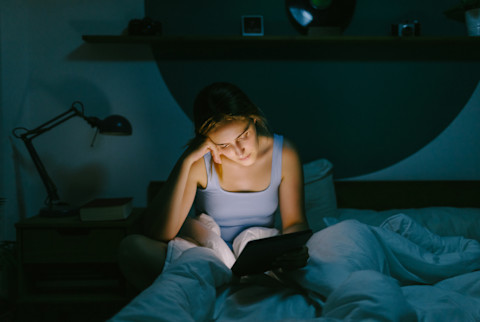
Some women will know the feeling all too well: The one where you're lying in bed but your mind is still racing around when you hear a faint noise come in from across the covers. It builds, surely and steadily, until you're swimming—awake and alert as ever—in a pool of your boyfriend's or husband's snores.
Wendy M. Troxel, Ph.D., a clinical psychologist and certified behavioral sleep medicine specialist, hears stories like this all the time. She says that the majority of her patients who struggle with insomnia symptoms are women with male partners, for whom sleep seems to come easy. Her experience tracks with what research has found about sleep's gender disparities: Studies from Korea1 to Latin America2 have come to the same conclusion: Women are twice as likely to have sleep issues as men.
I asked Troxel what's causing our sleep to suffer, and it looks like this is yet another thing we can blame on the patriarchy—and our hormones.
Why women are more likely to have sleep issues.
This gender gap is driven by a few factors, the first of which is cultural. Since women have historically taken on the role of family caregiver, once we have kids, we feel obligated to soothe them when they wake up in the middle of the night. Even after children grow out of their fussy phase, though, our compulsion to be "on" every night doesn't necessarily go away.
"Many women that I talk to, even years after having children, will describe that ever since they had children and got into the habit of waking up in the middle of the night to care for them, they've never slept as deeply," Troxel tells mbg.
There's likely a hormonal component at play here as well: "We do know that sleep problems are very common during pregnancy as well as during the menopausal transition," Troxel says. While we don't know exactly which hormonal fluctuations drive insomnia, it's likely a combination of the ones involved in the menstrual cycle3 (progesterone, luteinizing hormone, prolactin, etc.). The uncomfortable physical symptoms of menstruation, pregnancy, and menopause also keep many women up at night.
These family obligations and hormonal changes can converge to make women of all ages more likely to experience prolonged symptoms of insomnia: difficulty falling asleep; difficulty staying asleep; or poor, unrefreshing sleep quality, with associated daytime consequences.
"What's truly interesting though about the difference between men's and women's sleep," Troxel concludes, "is that although women are twice as likely to have insomnia as men, in general, women are kind of better sleepers than men."
She elaborates that a number of large-scale, epidemiologic studies4 have found that women tend to sleep for longer and spend more time in deep sleep than men every night on average. "Even while they are sleeping more deeply, certain parts of their brain are showing more activity during sleep," Troxel adds. "That corresponds with what women often say: 'Yes, I may be sleeping, but my mind is always active.'"
This discrepancy may be a sign that the way we measure sleep quality isn't nuanced enough. In the coming years, as we get a better understanding of what a "good night's sleep" really means, Troxel predicts it could be subject to change.
How to improve sleep quality, regardless of gender.
If you struggle with sleep and don't wake up feeling rested, the first step is identifying the underlying problem. If crying kids (or the muscle memory of crying kids) are keeping you up at night, check out this sleep advice specifically for parents. If it's a hormonal issue that's messing with your sleep for a few nights a month, consider adjusting your diet to further support your body during that time.
If the issue is more difficult to pinpoint—maybe it's something amorphous, like stress—consider where you can clean up your overall sleep habits. Stick to a consistent bedtime and wake-up time, turn off your tech one to two hours before bed, optimize your bedroom for sleep, and/or try a sleep-promoting supplement.
The bottom line.
Research consistently finds that women around the world are more likely to struggle with sleep than men are. However, the sleep that they do get tends to be higher in quality than men's (at which point I ask, is there anything that we aren't better at?); a good reminder that prioritizing sleep is important, no matter your gender.
